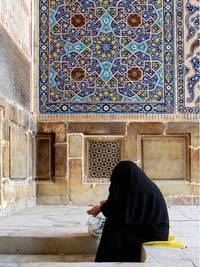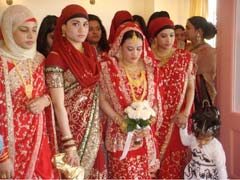- Trending:
- Forgiveness
- |
- Resurrection
- |
- Joy
- |
- Afterlife

RELIGION LIBRARY
Islam
Gender and Sexuality
Muslim societies, like other human societies under the impact of modernity, have undergone profound changes in gender relationships in the last 150 years. Many of these changes, although controversial at the time, have proven to be durable. Other changes, or proposed changes in the name of greater gender equality, remain controversial, as evidenced by the fact that many Muslim countries have qualified their commitments to gender equality to the extent that such a commitment might conflict with principles of the shariah. Despite the fact that Muslim women have made enormous social progress in the last 150 years, the relationship of Islam to gender equality remains one that is extremely contentious. A more helpful way of understanding contemporary notions of gender equality among religiously committed Muslims is to begin with the contexts in which equality is being demanded. Accordingly, Muslims react to equality claims differently depending on whether the claim is made in a ritual context, a family context, or a public context.
Islam, like other pre-modern religions, took for granted that differences between men and women were fundamental, and thus it was perfectly appropriate to treat men and women differently. Indeed, because the assumption of inherent gender differences was so pervasive in the pre-modern era, commitments to gender equality, such as they were, are particularly important to highlight. Traditional Islam is interesting in this regard because it provides important support for the principle of gender equality in many cases even as it affirms traditional conceptions of gender.
The clearest context in which gender equality claims are most likely to be controversial is in ritual law. Muslims have traditionally viewed ritual law as something that, by definition, is not amenable to rational analysis, and accordingly is in principle impervious to principled change. At the same time, Islamic ritual law, while it promotes gender equality to the extent that it imposes the same ritual obligations on both men and women, uses gender to differentiate the ritual obligations of both genders. For example, menstruation is considered a bar to the performance of ritual obligations. In addition, the vast majority of ulama do not recognize as valid the ritual prayer of a man if the imam of the prayer is a woman. It may be the case that in certain Muslim communities, concepts such as "bid‘a hasana"—a praiseworthy innovation—could be used to justify greater involvement of women in the public ritual life of the Muslim community, but despite efforts of North American Muslim women to have women lead mixed-sex congregational prayers, it is unlikely that these efforts will bear fruit in the short-term, even among relatively liberal Muslim populations such as those in North America.
The clearest context in which Islam supports gender equality is the context of private law. As a general rule, gender was irrelevant to the capacity of a person to enter into contractual relations with others. While Islamic law did recognize the relevance of gender to questions of legal capacity, once a woman attained full legal capacity, she enjoyed the same rights in private law as did a man. Accordingly, she could buy or sell her own property without the consent of any third party including her husband or father. She could also engage in acts of charity without third party consent. It is probably the basic commitment to equality in the context of private transactions that prevents much opposition among Muslims to women serving in the learned professions such as academics, attorneys, engineers, and physicians.
At the same time, however, for most pre-modern Muslim theologians, women were barred from holding political offices, such as that of a judge or head of state. This limitation, however, is one that has largely passed, as most Muslim countries have permitted women to hold political offices, and three Muslim countries—Turkey, Pakistan, and Bangladesh—have even had women serve as their prime ministers. The Islamic Society of North America, one of the largest grassroots Muslim organizations in North America, recently elected a woman to serve as its president. Indeed, even many otherwise conservative Muslim theologians of the modern period do not have principled objections to women's participation in public political life as long as they observe Islamic norms of modesty. Women have played important roles as activists in many modern Islamic political movements.
 Islam's role as a force for gender equality is most ambiguous in family law. Islam, like other pre-modern religions, began with a strong commitment to a gendered division of labor within the family, with the conventional expectation that the male is a breadwinner and the female is restricted to the household, as reflected in the rules of Islamic law. As a result, the male is given some privileges within a marriage that the female lacks. Among these is the right to initiate divorce unilaterally, while the female must obtain either a judicial divorce or her husband's consent if she wants a divorce.
Islam's role as a force for gender equality is most ambiguous in family law. Islam, like other pre-modern religions, began with a strong commitment to a gendered division of labor within the family, with the conventional expectation that the male is a breadwinner and the female is restricted to the household, as reflected in the rules of Islamic law. As a result, the male is given some privileges within a marriage that the female lacks. Among these is the right to initiate divorce unilaterally, while the female must obtain either a judicial divorce or her husband's consent if she wants a divorce.
Because the male is legally the head of the household, he is entitled to make decisions on its behalf, such as where the family will reside. He is also given decision-making power over the welfare of the children. While there may be a moral norm that he exercises these privileges for the good of the household and in consultation with the wife, the wife is expected to defer to her husband's decisions with respect to these decisions. The husband's prerogatives of control over the household do not entitle him, however, to interfere with his wife's personal rights, such as control over her own property.
Finally, Islamic law gives men (but not women) the right to contract up to four marriages simultaneously provided that certain conditions are met. The wife's primary legal obligation arising out of marriage is to make herself available to her husband for sexual intercourse. Whether the wife is obliged to perform housekeeping and other domestic chores is a matter of disagreement among Muslim jurists, but in any case, even for those who recognize such a duty, the duty is generally limited to the kind of household work she would do for herself.
 It is important to keep in mind, however, that because Islamic law understands the marital relationship to be contractual, the parties to a marriage contract can, and do, vary these rules to suit their own needs. For example, it is not unusual for women to include terms in their marriage contracts that would protect them from the risk that a husband would marry a second woman. A woman could also write into the marriage contract the right to divorce or a contractual stipulation regarding the location of the household. It is also important to understand that not all moral norms governing relationships between spouses are reflected as legal rules. Values such as love, generosity, and mutual support, are all normative elements of the Islamic conception of marriage. The Quran, for example, states that among God's signs is that "He made for you mates from yourselves that you may find tranquility with them, and caused love and compassion to arise between you" (Al-Rum, 30:21). Such values do not necessarily form part of the legal system's regulation of the parties' rights within marriage or upon its dissolution.
It is important to keep in mind, however, that because Islamic law understands the marital relationship to be contractual, the parties to a marriage contract can, and do, vary these rules to suit their own needs. For example, it is not unusual for women to include terms in their marriage contracts that would protect them from the risk that a husband would marry a second woman. A woman could also write into the marriage contract the right to divorce or a contractual stipulation regarding the location of the household. It is also important to understand that not all moral norms governing relationships between spouses are reflected as legal rules. Values such as love, generosity, and mutual support, are all normative elements of the Islamic conception of marriage. The Quran, for example, states that among God's signs is that "He made for you mates from yourselves that you may find tranquility with them, and caused love and compassion to arise between you" (Al-Rum, 30:21). Such values do not necessarily form part of the legal system's regulation of the parties' rights within marriage or upon its dissolution.
Islamic family law is best understood as establishing a minimum baseline regarding family life that parties, within certain boundaries, are free to modify. Because of the flexibility of Islamic family law, Muslim countries in the 20th century have engaged in a wide variety of family law reform projects with the intent of furthering greater equality within the traditional heterosexual family by, among other things, restricting polygyny and reducing the male's right to initiate unilateral divorces. Many groups of Muslims continue to advocate for further reforms of the Islamic family law codes that are applied in the Muslim world and one may reasonably expect that further reforms in the direction of greater gender equality will be made in the Muslim world in the foreseeable future.
English-speaking Muslims typically do not apply Islamic family law rigorously in the regulation of their marriages and divorces. Accordingly, most disputes involving Islamic family in the North American context, for example, raise the question of whether the husband's obligation to pay his wife a dowry (mahr or sadaq) as specified in their Islamic marriage contract is enforceable as an ordinary civil obligation. While it is customary for a Muslim couple to enter into an Islamically-recognized marriage contract, it would be unusual for the couple not to register their marriage civilly. Well-established North American Islamic centers typically refuse to prepare an Islamic marriage contract for a couple until they first produce a civil marriage license or evidence of a valid marriage under civil law.
Practices such as unilateral divorce (especially a unilateral and irrevocable divorce) had been long been frowned upon in traditional Islamic law (even though they were legally effective), and as such are rare among Muslim communities in North America. To the extent a husband purports to exercise such a right, the weight of opinion among contemporary Muslim authorities would deny the effectiveness of such a divorce. Ultimately, however, at least as a matter of religious law (but obviously not civil law), the decision to recognize the effectiveness of such a divorce turns on the religious scruples of the couple involved. If the wife sincerely believed that a divorce took place, for example, then she would be ethically bound to leave her husband, and vice-versa. The great majority of Muslim religious authorities in North American Muslim communities also counsel Muslims to refrain from polygyny on the grounds that it is not permitted under domestic law. On the other hand, given the substantial possibility that laws criminalizing polygyny could very well be struck down as unconstitutional in either the United States or Canada, the Islamic objection to polygyny in North America based on its illegality would be subject to revision.
Islamic norms of sexuality are closely connected with Islamic marital law. Indeed, one of the primary purposes of Islamic marital law is to make sexual relations licit. The taboo against extramarital sex is set forth clearly in the Quran and the sunna of the Prophet Muhammad, and pre-modern Islamic law applied harsh penalties to illicit sexual intercourse. These harsh penalties—lashes for the unmarried fornicator and stoning to death for the married adulterer—although mitigated by impossibly unrealistic evidentiary standards (four male witnesses of outstanding character to the act of penetration), served the purpose of communicating the moral gravity of illicit intercourse.
While modern Muslims have little taste to apply such penalties, traditional views regarding the immorality of extramarital sexual relations continue to prevail in Muslim societies, leading some observers to point out that it is Muslims' continued commitment to traditional norms of sexual propriety that represents the most substantial cultural difference in the modern world separating Muslim popular culture from the popular culture of non-Muslim societies. Muslims' continued commitment to the traditional norm that sex is only licit within marriage may be explained in part by the relative ease of access to both marriage and divorce within the Islamic tradition, so that serial monogamy, for example, has been and continues to be, a realistic option in Muslim societies.
Finally, open homosexuality remains a strict taboo in Muslim societies. Here, however, the privacy norm complicates sexual practices in Muslim societies. There is little doubt that homosexuality is widespread in Muslim societies. Because of Islamic norms of privacy, however, private homosexuality can be and was tolerated, so much so that 19th-century Europeans tended to view Islamic societies as sexually liberated havens relative to Europe. This toleration, however, was based not so much on acceptance of homosexuality as a legitimate expression of sexuality, but rather as conduct which, so long as it was confined to private spaces, was not anyone else's business. Such a theory, while making space for homosexuality, does not, nor could it contemplate legitimizing homosexual relationships by, for example, recognizing same sex marriage.
Study Questions:
1. Why were men and women treated differently at the time of Islam’s origins?
2. How does ritual contribute to gender inequality, even in contemporary society?
3. Where do women have the most power? Where do they seem the most powerless?
4. How do civil laws influence the ritual of marriage within Islam?
5. What is the role of sex within Islam?










